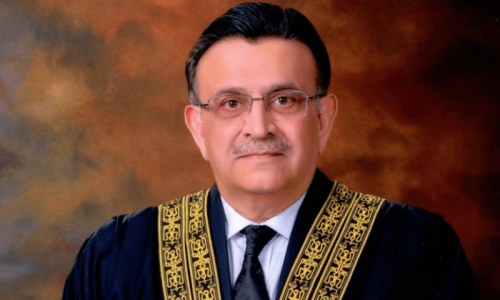Chief Justice of Pakistan (CJP) Umar Ata Bandial said on Friday that the apex court would welcome any remedy against Article 184(3) if it was done with caution.
Article 184(3) of the Constitution sets out the Supreme Court’s (SC) original jurisdiction and enables it to assume jurisdiction in matters involving a question of “public importance” with reference to the “enforcement of any of the fundamental rights” of Pakistan’s citizens.
CJP Bandial made the remarks as a three-member SC bench heard a set of appeals challenging the Supreme Court (Review of Judgments and Orders) Act, 2023 and the Election Commission of Pakistan’s (ECP) review against the verdict fixing May 14 as the date for holding Punjab Assembly elections.
At yesterday’s hearing, the top judge stated that the SC had no issue with the new law, expanding the scope of review petitions under Article 184(3), but the problem lay in the way the law was enacted.
The chief justice observed that the government can enact any law which provides an effective remedy in case of the apex court’s decisions but the problem lies with the method and manner of enacting the law. He said changes should have been made through a constitutional amendment and not ordinary law.
During today’s hearing, Attorney-General for Pakistan (AGP) Mansoor Usman Awan presented his arguments.
Giving the example of a 2002 judgement by the Indian supreme court regarding curative pleas, Awan said: “The Indian supreme court had said that ensuring justice is no less important than the finality of a decision. The verdict said that absolute justice is God’s desire.”
At this, Justice Munib Akhtar said that a review was still a review and was not granted the status of an appeal.
The CJP then remarked that a “complete test of justice” lay before the SC, adding that the Indian law also stated the same. “In an appeal, a case is heard once again. We should solve this issue,” he said.
“We welcome any remedy against Article 184(3) of the Constitution if it is done with caution. The question is on what basis a review should be allowed,” he said.
In his arguments, the AGP also said that from high courts to the top court, petitioners were given the opportunity to present their cases. “That is why the SC has limited the scope of review,” he said.
He said that under Article 184(3), the SC heard the case directly which is why the scope of review under the article had been expanded. He argued that because of this, petitioners would be able to “fully convince the court”.
Due to the limitations of the scope of review, many affected persons were not able to file review petitions, he said. Awan further said that the constitution of a larger bench did not mean that it would exclude the judges who originally heard the case.
“If a three-member bench makes a decision, then two more judges will hear the case alongside them in the review,” he said.
At one point during the hearing, the ECP’s lawyer said that he would also like to present his arguments. However, the CJP told him that he was “invited as a guest” and the SC was not hearing the electoral watchdog’s case at the moment.
The hearing was later adjourned for Monday (June 19) at 1pm.














































Dear visitor, the comments section is undergoing an overhaul and will return soon.